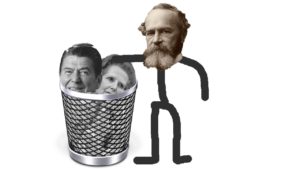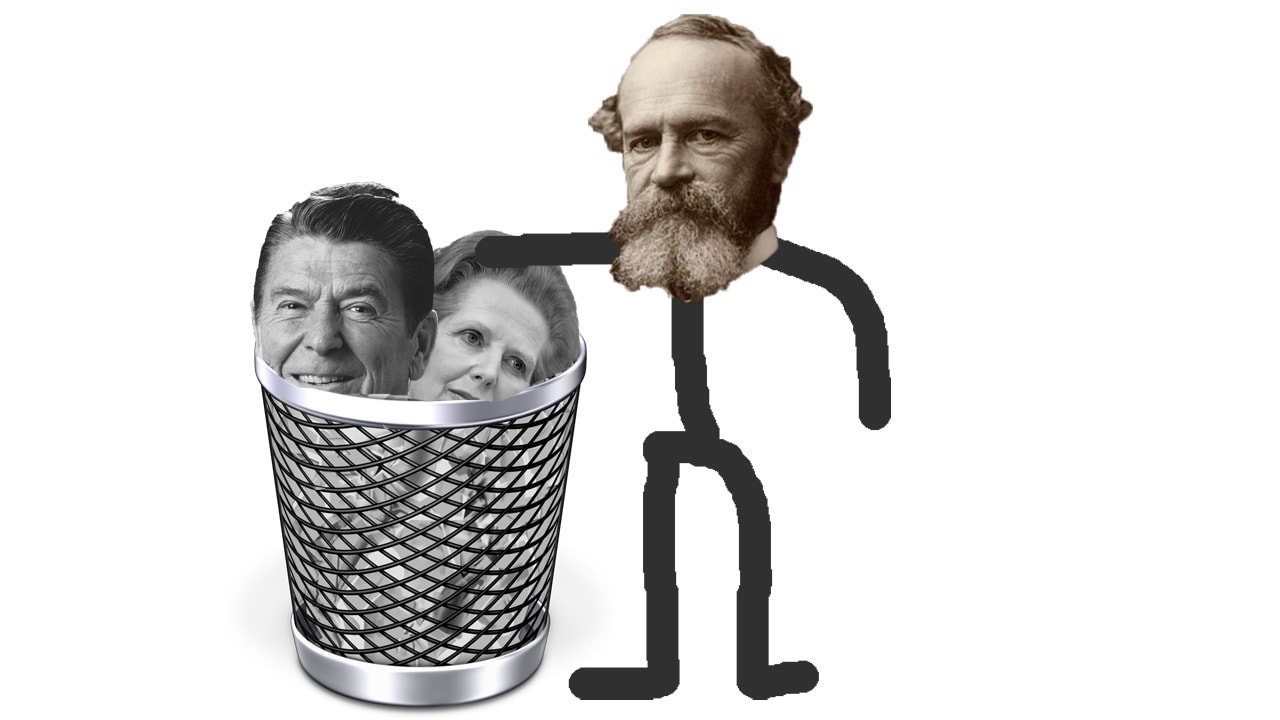By Miko Lepisto and Jooseppi Räikkönen (KCL student)

Image: Wikimedia Commons and http://all-free-download.com/free-vector/download/trash-can_312801.html
Everyone wants to be called pragmatic. Most people do not want to be told that their views do not correspond to reality, or that their ideas have no real-world use. However, many take the term unpragmatic as a badge of honour and brandish it for all to see, but even then there is often a degree of irony involved. Artists, philosophers, students, the young and other deviant subcultures embrace a self-titled un-pragmatism as a reaction to a grey world marred by mass consumption, non-reflection, capitalism, adults or any other factor seen as conservative or limiting. I know someone who has a memory of being told as a child to not eat a whole cake on his own, or he would vomit. Of course that rebellious child proceeded, as soon as he got out of the watchful gaze of his parents, to do both of those things.
Calling non-conformists and left-wingers of all kinds unpragmatic idealists is a sort of a conservative sport that has become quite banal by now – the iconic phrase hippie get a job has entered a internet-enhanced spiral of meme, counter-meme, and the absurd. In fact, we have gone as far as to idolize those who think different and invent disruptively; nowadays, we toast the crazy ones, the misfits, the rebels…
As much as we enjoy criticizing conservatism and the neoliberal branding of billionaires as some kind of social revolutionaries – that is not the point of this article. All of these examples have a thing in common: pragmatism defined as something of immediate utility, an acceptance of current practical facts based on an anti-normative reality. It is a creation of a false dichotomy between pragmatism and idealism. This popular conception of pragmatism was particularly strong in politics in the wake of New Public Management and third-way liberals in the 1980s and 90s – a politics intended to depoliticize the political. Public issues are turned into technical problems of management – and pragmatic is the adjective used to describe correct solutions. However, at its inception, pragmatism is a philosophical school of thought, and not merely a cold-hearted approach to politics.
One should make a critical distinction between an instrumental and a pragmatic conception of truth. Instrumentalism corresponds to the views described above, as well as to what a not-so-recent column in The Sundial Press qualified as pragmatism. It can be assimilated to politics of compromise, of qualifying what is the truth – good in the field of logic – by what is useful. The distinction may seem inconsequential, but the matter is not one to be grasped without intellectual effort. A symptom of the times is that economics is seen by the establishment as something only experts can handle, a science of the erudite to some extent, but philosophy must be reducible to monetized 3-minute bite-sized videos or face condemnation as useless idealism. What follows is some of that idealism.
Pragmatism as a tradition is fundamentally inclusionist. The goal of its founder C.S. Peirce seemed in most of his philosophical undertakings to be to try and render discourse clear and meaningful. In one of his better known papers “How to make our ideas clear” this outlook is already echoed in the name. Therein, Peirce gave the following formulation of the pragmatic maxim: “Consider what effects, that might conceivably have practical bearings, we conceive the object of our conception to have. Then, our conception of these effects is the whole of our conception of the object.” It’s hard to see how you’d construe this as a definition of truth. Pragmatism really didn’t pretend to be a definition of truth, it was a maxim of logic for attaining it. Even so, many pertain to it, and even justify the reductionist theory in a circle. “Pragmatism tells us what is useful is true – pragmatism is useful, therefore; pragmatism is true.” Peirce, the astute logician he was, rolls in his grave.
William James echoes similar sentiments in his paper “The Present Problem in Philosophy”, where he shows us the rotten fruit in the philosophy of his time. James thought that philosophy was split into two camps, the tender-minded and the tough-minded. The tender minded were rationalistic, idealistic and tended to be religious. They believed in free will and often supplied semi- or fully religious answers to philosophical problems. The tough-minded on the other hand had an empiricist bent. They did not believe in free will, were pessimistic, sceptical and often had a very bleak world view. James, distressed by the zeitgeist, offered to bridge the two. Pragmatism would, as a philosophy, offer us a place in between these two extremes. The pragmatist is a humanist in the greatest sense. In Pragmatism there is space for religious experience, albeit one that is answerable to science given any conflict. Same applies vice versa, science is fully permitted, even endorsed, as long as it finds its place among other modes of life.
The “realist” anti-normative movement in politics seems more to align with what James would have called the tough-minded philosophy. Pragmatism, as it was conceived by him and Peirce seems hardly to have anything to do with it. Peirce was very much in support of there being a science of norms and ethics. He called the sciences investigating ‘the good’ the normative sciences. James, proposing a synthesis of the strictly scientistic and religious worldviews, was open to scientific investigation into ethics. There is, you see, a halfway point between a religious ethic and a purely anti-realist stance. It is the belief, that there are some ethical truths, independent from, and of, us. These truths can be the object of scientific research, at least according to the pragmatists.
James finishes his essay “Is life worth living?” with a strikingly existentialist note on the fundamental question of human existence. “Be not afraid of life. Believe that life is worth living, and your belief will help create the fact. The ‘scientific proof’ that you are right may not be clear before the day of judgement is reached. But the faithful fighters of this hour or the beings that then and there will represent them, may turn to the faint hearted who here decline to go, with words like those with which Henry IV greeted the tardy Crillon after a great victory had been gained; ‘Hang yourself, brave Crillon! We fought at Arques, and you were not there.’ ”
So choose the path of Crillon, be a political pragmatist, live with the spirit of the times! Look at the suffering of your fellow humans, and tell them you weren’t there to help.
This article was written in co-operation by KCL philosophy student Jooseppi Räikkönen and Sundial Press columnist Miko Lepistö.
Other posts that may interest you:
- Local Victories for Turkish Opposition — A Sign of Hope?
- Are France and Japan a Mismatch Made in Heaven?
- A Reflection on Dark Tourism
- Cadavre Exquis : Goodbye stranger
- An Untoward Progress?
Discover more from The Sundial Press
Subscribe to get the latest posts sent to your email.





